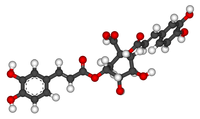Cynarine
Cynarine
 |
 |
| Names |
| IUPAC name
(1R,3R,4S,5R)-1,3-bis[[(E)-3-(3,4-dihydroxyphenyl)prop-2-enoyl]oxy]-4,5-dihydroxycyclohexane-1-carboxylic acid |
| Other names
1,5-Dicaffeoylquinic acid; Cynarin; Cinarin; Cinarine |
| Identifiers |
| |
212891-05-9  N N |
| 3D model (Jmol) |
Interactive image |
| ChEMBL |
ChEMBL2105478  N N |
| ChemSpider |
4445082  N N |
| PubChem |
5281769 |
| UNII |
85D81U9JAV  N N |
InChI=1S/C25H24O12/c26-15-5-1-13(9-17(15)28)3-7-21(31)36-20-12-25(24(34)35,11-19(30)23(20)33)37-22(32)8-4-14-2-6-16(27)18(29)10-14/h1-10,19-20,23,26-30,33H,11-12H2,(H,34,35)/b7-3+,8-4+/t19-,20-,23+,25-/m1/s1  N NKey: YDDUMTOHNYZQPO-RVXRWRFUSA-N  N NInChI=1/C25H24O12/c26-15-5-1-13(9-17(15)28)3-7-21(31)36-20-12-25(24(34)35,11-19(30)23(20)33)37-22(32)8-4-14-2-6-16(27)18(29)10-14/h1-10,19-20,23,26-30,33H,11-12H2,(H,34,35)/b7-3+,8-4+/t19-,20-,23+,25-/m1/s1 Key: YDDUMTOHNYZQPO-RVXRWRFUBT
|
C1[C@H]([C@@H]([C@@H](C[C@]1(C(=O)O)OC(=O)/C=C/C2=CC(=C(C=C2)O)O)OC(=O)/C=C/C3=CC(=C(C=C3)O)O)O)O
|
| Properties |
| |
C25H24O12 |
| Molar mass |
516.46 g·mol−1 |
Except where otherwise noted, data are given for materials in their standard state (at 25 °C [77 °F], 100 kPa). |
 N verify (what is N verify (what is  Y Y N ?) N ?) |
| Infobox references |
|
|
Cynarine is a hydroxycinnamic acid and a biologically active chemical constituent of artichoke (Cynara cardunculus).[1]
Chemically, it is an ester formed from quinic acid and two units of caffeic acid.
It inhibits taste receptors, making water (and other foods and drinks) seem sweet.[2]
It is an ingredient of the drug Sulfad.
See also
References
- ↑ Panizzi, Luigi; Scarpati, Maria Luisa (1954). "Constitution of Cynarine, the Active Principle of the Artichoke". Nature. 174 (4440): 1062–3. doi:10.1038/1741062a0. PMID 13214078.
- ↑ Feifer, Jason (May 2011). "A Matter of Taste". Men's Health. 26 (4): 140.
|
|---|
|
| Aglycones | Precursor | |
|---|
| Monohydroxycinnamic acids
(Coumaric acids) | |
|---|
| | |
|---|
| Trihydroxycinnamic acids | |
|---|
| O-methylated forms | |
|---|
| others | |
|---|
|
|---|
|
| Esters | glycoside-likes | Esters of
caffeic acid
with cyclitols | esters of
quinic acid |
- Chlorogenic acid (3-caffeoylquinic acid)
- Cryptochlorogenic acid (4-O-caffeoylquinic acid)
- Neochlorogenic acid (5-O-Caffeoylquinic acid)
- Cynarine (1,5-dicaffeoylquinic acid)
- 3,4-dicaffeoylquinic acid
- 3,5-dicaffeoylquinic acid
|
|---|
| esters of
shikimic acid | |
|---|
|
|---|
| Glycosides | |
|---|
|
|---|
| Tartaric acid esters | |
|---|
| Other esters
with caffeic acid | |
|---|
| Caffeoyl phenylethanoid
glycoside (CPG) |
- Echinacoside
- Calceolarioside A, B, C and F
- Chiritoside A, B and C
- Cistanoside A, B, C, D, E, F, G an H
- Conandroside
- Myconoside
- Pauoifloside
- Plantainoside A
- Plantamajoside
- Tubuloside B
- Verbascoside (Isoverbascoside, 2'-Acetylverbascoside)
|
|---|
|
|---|
|
| Oligomeric forms | Dimers |
- Diferulic acids (DiFA) : 5,5'-Diferulic acid, 8-O-4'-Diferulic acid, 8,5'-Diferulic acid, 8,5'-DiFA (DC), 8,5'-DiFA (BF), 8,8'-Diferulic acid
|
|---|
| Trimers | |
|---|
| Tetramers | |
|---|
|
|---|
|
Conjugates with
coenzyme A (CoA) | |
|---|

